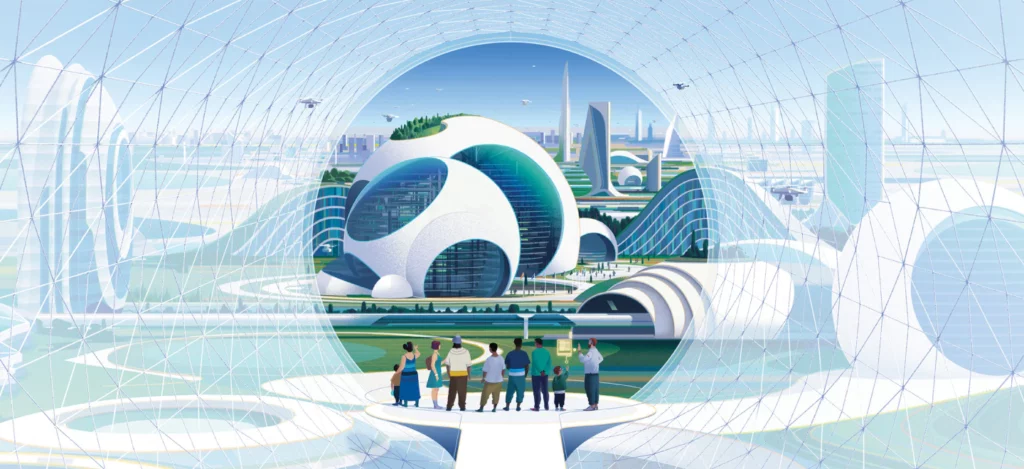Introduction
As we stand on the threshold of a new era marked by technological advancements, global challenges, and shifting societal paradigms, the future of governance is undergoing a profound transformation. The way nations are governed, decisions are made, and policies are implemented is evolving to address the demands of a rapidly changing world. In this blog post, we will explore the intricate facets of the future of governance, from technological integration to inclusive policies, and how these elements are shaping tomorrow’s political landscape.
The Nexus of Technology and Governance
1. Technological Revolution
- Digital Governance: Technology is revolutionizing governance, from e-governance platforms to digital identification systems.
- Data-Driven Decisions: Data analytics and artificial intelligence empower governments to make informed decisions based on real-time information.
2. E-Governance and Citizen Participation
- Direct Engagement: E-governance platforms enable citizens to participate in decision-making processes and voice their opinions.
- Transparency and Accountability: Digital systems enhance transparency by providing accessible records of government actions.
3. Challenges and Ethical Considerations
- Data Privacy: The integration of technology raises concerns about data privacy and the potential for surveillance.
- Digital Divide: Ensuring equal access to technology and digital literacy is essential to prevent marginalization.
Inclusivity and Diversity in Policy-Making
1. Intersectional Policies
- Gender and Equality: The future of governance involves crafting policies that address gender disparities and promote equality.
- Inclusion of Marginalized Groups: Policies should prioritize vulnerable populations to ensure equitable development.
2. Empowerment of Youth and Marginalized Voices
- Youth Participation: Empowering youth to participate in governance ensures a more inclusive political landscape.
- Indigenous and Minority Voices: Ensuring representation of indigenous and minority groups is crucial for comprehensive policy-making.
Global Challenges: Collaborative Governance
1. Climate Change and Environmental Policies
- Global Cooperation: Addressing climate change requires international collaboration to mitigate its impact.
- Green Policies: Governments are expected to formulate green policies that promote sustainability and combat environmental degradation.
2. Health and Pandemic Preparedness
- Global Health Initiatives: The future of governance involves strengthening global health governance to address pandemics and health crises.
- Research and Preparedness: Governments must collaborate to ensure swift response and preparedness in the face of health challenges.
Ethical Leadership and Governance
1. Transparent Leadership
- Accountability: Ethical governance demands leaders take responsibility for their actions and decisions.
- Anti-Corruption Measures: Implementing anti-corruption policies ensures that resources are utilized for the greater good.
2. Civic Engagement and Grassroots Movements
- Voice of the People: Civic engagement is crucial for ethical governance, allowing citizens to hold leaders accountable.
- Collaborative Solutions: Governments should work with civil society to develop solutions that reflect diverse perspectives.
Adaptive Governance Models
1. Flexibility and Resilience
- Agility in Policy-Making: Governments must be adaptable to rapidly changing circumstances and unforeseen challenges.
- Crisis Management: Developing crisis response protocols enhances resilience in governance.
2. Decentralized Governance
- Local Empowerment: Decentralization of power empowers local communities to make decisions that reflect their unique needs.
- Diverse Approaches: Different regions require tailored policies, and decentralized governance allows for customized solutions.
Conclusion: Shaping the World of Tomorrow
The future of governance is marked by a convergence of technological innovation, ethical leadership, and global collaboration. As we navigate the challenges and opportunities of an increasingly interconnected world, the way we govern ourselves is evolving to accommodate the aspirations and needs of citizens. By embracing technology responsibly, prioritizing inclusivity and diversity, and engaging in global collaborations, governments can pave the way for a more just, sustainable, and prosperous future. The transformation of governance models and policies is not merely a political exercise—it is a reflection of our collective commitment to shaping a world that caters to the well-being and progress of all its inhabitants.




